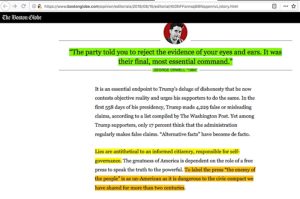Similar to the February 2015 resurgence of Kert Davies, a long-time promulgator of the ‘industry-corrupted skeptic climate scientists’ accusation, enviro-activist writer Mark Hertsgaard has returned in zombie-like fashion, once again illustrating his very old one-trick pony narrative about ‘Big Oil financing a disinformation campaign to undercut the certainty of man-caused global warming.’
Continue reading
Category Archives: mainstream media reporting
“If nobody spots our fatal problem, we should be just fine.”
Enviro-activists put all their faith in the notion that their superficial, repetitive fear mongering narratives about man-caused catastrophic global warming will never be questioned by the greater public. A fun video from Anthony Watts’ WUWT blog marvelously shows how the folly of such blind faith surfaces after careful scrutiny of those collective narratives. “The Arctic is warming twice as rapidly as anywhere else …”? Oops. The ‘double-the-rate’ seems to be happening literally everywhere. Back in 2012, blogger Tom Nelson illustrated how the places hardest hit by global warming — ground zero, according to screaming headlines — is, well … literally everywhere. Oops. Over just the last year, headlines naming myriad different locations still scream the same way.
Same thing applies to fear mongering narratives implying energy company industry executives pay ‘shill scientists’ in a conspiracy to spread disinformation undercutting the supposedly settled science about CO2 pollution from burning fossil fuels. Continue reading
What was #Greta Thunberg Taught, and Who Taught Her about It?
Remember the classic “It’s the Great Pumpkin, Charlie Brown” TV special, where the little girl Sally decided to stay with Linus in his pumpkin patch to await the imminent arrival of The Great Pumpkin, rather than participate in the Trick or Treating fun all children enjoy when they celebrated Halloween? “I was robbed!! … I’ll sue!” she exclaimed, upon realizing Linus’ prophetic vision failed to happen. It was a whimsical illustration; everyone understands Sally’s frustration about losing the chance to enjoy an event which happens only once a year, and we all see how Linus is sincere but is comically misguided. But this same personal situation befalling “climate warrior” #GretaThunberg could personally harm her in a far more serious and damaging way. Continue reading
Open Letter to Senator Mitt Romney – Carbon Emissions Are Not The Problem, Egregious Mainstream Media Bias Is The Problem
The following is verbatim to what I sent to Senator Mitt Romney earlier today, Continue reading
And the Award for Climate Change Propagandism Goes to…
Old-school, hard-nosed, traditional reporters don’t merely accept superficial information without question, they spot inconsistencies in the material and go digging in order to find out why the details don’t line up right. Three weeks ago, The Weather Channel website featured a hit piece against the Heartland Institute authored by Pam Wright, which Heartland’s Jim Lakely dissected yesterday here. As ever with such dissections, there’s always more. From my own unique bit of expertise on the political side of the global warming issue, let my politely suggest that Pam Wright should not quit her day job as a propagandist to become an old-school reporter. Continue reading
The Dead Global Warming Issue exemplifies the Mainstream Media Journalistic Malfeasance Problem
A recent news item about a journalism school dean praising the ‘deep analysis’ presentation of PBS NewsHour reports, in conjunction with the NewsHour opening a bureau right at his school, prompts cause for concern about whether journalism schools have stopped teaching old-school hard-nosed reporter tactics in favor of spreading ‘save-the-world propaganda’ under the guise of it being outright “news.” Continue reading
Al Gore Channels Ross Gelbspan
What’s new is still old again, over at the PBS NewsHour. Continue reading
Using Fake News to Criticize the Label of “Fake News Media”
Today’s the day, 8/16/18, for the big pushback by newspaper editorialists led by the Boston Globe against U.S. President Donald Trump’s so-called label of them as “the enemy of the people.” Of all things to use in their conclusion, they chose a line from George Orwell’s “1984” book, followed by an utterly misplaced line about how lies are antithetical to an informed citizenry (click image to enlarge).
Oh really? Isn’t failing to tell the whole truth while engaging in alleged ‘journalism’ even more antithetical? Continue reading
Al Gore’s 1994 ABC News Nightline ‘Crooked Skeptics’ Name-Calling Failure
You couldn’t ask for a more damaging report to reappear against Al Gore and enviro-activists’ collective notion that ‘skeptic climate scientists are on the payroll of Big Coal and Oil’ — inexplicably posted to Youtube just weeks ago by Kert Davies, one of the main promulgators of that accusation. Quoting Nightline host Ted Koppel in this February 24, 1994 “Is Science for Sale?” program, starting at the 1:06 point,
A number of years ago, I ran into then-Senator Al Gore at LaGuardia Airport … Senator Gore used the occasion to sketch out on a napkin one of his chief ecological concerns, depletion of the ozone layer. Ever the environmental activist, Senator Gore was proposing a Nightline program on the subject. He’s the Vice President now, of course, but he is still proposing. A few weeks ago, Mr Gore called to draw our attention to some of the forces, political and economic, behind what he would regard as the anti-environmental movement. The Vice President suggested that we might want to look into connections between scientists who scoff at the so-called greenhouse effect, for example, and the coal industry.
Things go downhill from there. Continue reading
Is Blood thicker than Objective Reporting?
If anyone had engaged in a one-word internet search of the name “Oreskes” prior to October 31st, 2017, the results would have largely been for Naomi Oreskes, famed ‘exposer of corporate-corrupted skeptic climate scientists,’ with a sprinkling of other references to National Public Radio Chief Editor Michael Oreskes. After October 31st, albeit largely buried by news of the Manhattan terrorist attack, the news about Michael Oreskes’ alleged indiscretions was hard to miss. Continue reading

